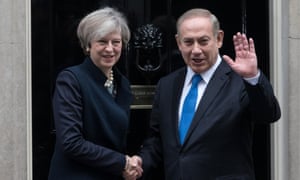Netanyahu wants to repress my group, Breaking the Silence. May, don’t help him..
Israel’s friends in the UK should fight to protect funding for an organisation that bears witness to the moral price paid for the maltreatment of Palestinians
 ‘I can shed some light why Netanyahu is so intent on stopping us, an organisation of soldiers who encourage public debate on the reality of occupation.’ Photograph: Tang/Zuma wire/Rex Features
‘I can shed some light why Netanyahu is so intent on stopping us, an organisation of soldiers who encourage public debate on the reality of occupation.’ Photograph: Tang/Zuma wire/Rex Features
On Monday the Israeli prime minister, Benjamin Netanyahu, met with his British counterpart, Theresa May. Among other things, he asked her to stop the UK government’s funding of the group I co-founded, Breaking the Silence, as well as other human rights organisations in Israel and Palestine. This is regardless of the fact that Breaking the Silence has not received funding from the British government since 2011.
As an Israeli, it’s not my place to tell Netanyahu to stop interfering in decisions made by the British government. That’s something British citizens can do. What I can do is shed some light on the reason Netanyahu is so intent on stopping us, an organisation of soldiers who encourage public debate on the reality of occupation and the moral price it exacts from Israelis.
As Netanyahu made his way back to Israel, the Knesset passed the regulation bill, a land expropriation law that seeks to retroactively legalise the theft of Palestinian land by Israel for the benefit of settlement development.
There’s nothing new about stealing Palestinian land for the purpose of settlement expansion. This is what Israel has been doing for nearly 50 years. It’s the only way we could have installed 700,000 Israeli settlers across the green line. Sometimes this land grab is achieved by declaring Palestinian land “state land” (Israeli property), and sometimes by sealing an area off for security purposes.
What’s new about the passing of this bill is that legislation concerning what goes on in Palestine – which until now was subject to the Israeli Defense Forces (the sovereign entity in Palestine) – was decided for the first time by the Israeli parliament, a body that Palestinians cannot vote for, and which therefore does not represent them.
In so doing, the Israeli parliament took my country one step closer towards being an apartheid state. But more than anything else, the regulation law clearly indicates that the Israeli government is neither interested in ending the occupation nor in achieving a two-state solution.
For the soldiers involved with Breaking the Silence, who served in Palestine and enforced the policy of occupation, this is not new. This reality became clear to me during my first days serving in the heart of Hebron. I was one of 650 combatants guarding 850 settlers in a city of 200,000 Palestinians.
One of our main missions was to “make our presence felt”. The idea was that if Palestinians experienced IDF presence in any place, at any time of day, they would be deterred from carrying out attacks. We operated three patrols in Hebron for this purpose. Day and night, we would go into the Casbah, the Old City of Hebron. Entirely at random, rather than on the basis of any intelligence, the officer or sergeant would pick a house. We woke up a family at two in the morning, fully armed, and searched the house – for no reason.
We then started knocking on the doors of houses and shops to make noise, in the middle of the night. We ran to the other side of the Old City, entered another house – and this continued for eight hours, until the end of our shift.
This has been the protocol: 24 hours a day, seven days a week, since the start of the second intifada in September 2000. The sole purpose was to intimidate the Palestinian population through what we called “creating a sense of persecution”. Because this is what you have to do, when you want to maintain control over millions of people with no rights, and with no endgame in sight. The only way to do it is to induce constant fear, and as soon as this fear becomes routine, ramp it up more, to no end.
This is the kind of behaviour was carried out in the interest of bolstering occupation, not ending it. These are not the policies implemented by people who desire to live peacefully alongside millions of Palestinians in the West Bank, but rather by those seeking to control them forever.
This is the policy Netanyahu seeks to uphold, and why it’s so important to him to stop us or anyone else who tries to resist it. As Israelis, we must ask ourselves what kind of Israel we want, a democratic state or an apartheid state. We at Breaking the Silence choose democracy and human rights – and that’s why we’re working tirelessly to oppose the occupation.
Friends of Israel in the UK should ask themselves what it means to be pro-Israel: is it helping Netanyahu maintain the occupation, turning us into an apartheid state? Or is it helping to restore democracy through ending the occupation, thus actualising a two-state solution?
Geen opmerkingen:
Een reactie posten
Opmerking: Alleen leden van deze blog kunnen een reactie posten.